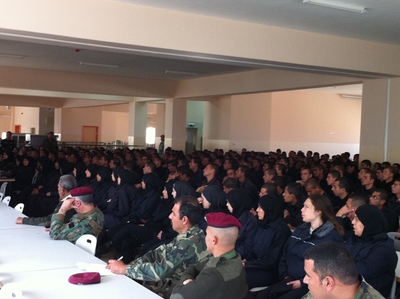The Urban Planning and Disaster Risk Reduction Center at An-Najah Participates in a Seminar in Jericho
A workshop on strategic planning for disaster risk reduction was organized at the Central Training Institute of the Palestinian Security Forces in Jericho. Participants included Major General Jum’a Al-Hamdallah, President of the Palestinian Training Body, Brigadier Wasef Eriqat, President of the National Agency for Disaster Risk Mitigation (NADRM) in Palestine, Dr. Jalal Dabbeek, Director of the Urban Planning and Disaster Risk Reduction Center at An-Najah and Vice President of NADRM, Engineer Arafat Buziya from Jawwal (Palestine Cellular Communications Company), Khaled Atyani from the Political Direction Body, Wala’ Aj’aj from the Urban Planning and Disaster Risk Reduction Center at An-Najah, in addition to the trainers and trainees.

At the beginning of the seminar Major General Al-Hamdallah welcomed the attendants and thanked the National Agency and An-Najah for their cooperation. Then he talked about the Institute, its establishment, development and achievements. He also familiarized the attendants with the Institute’s ambitions and future plans which indicated the advanced level that it attained with respect to preparing competent Palestinian military personnel.
Brigadier Eriqat spoke about the National Agency, its objectives, vision, and work plans. He also highlighted the Agency’s concern with building the capacity of the Palestinian society to deal with disastrous situations. Furthermore, he spoke about the role of National security forces in dealing with disasters and the importance of coordination and cooperation between theses forces and the institutions that work in the field of disaster management. He also pointed out the importance of training on possible scenarios and the implementation of field training.
In his speech, Dr. Dabbeek spoke about the basic concepts in the field of disaster risk assessment and risk management, integration and coordination, comprehensiveness in planning and the distribution of tasks, management and the Palestinian reality with its points of weakness and strength, the seismic risks in Palestine and the extent to which buildings are earthquake-resistant, as well as the importance of voluntary work and societal participation. Moreover, he spoke about the international regulations for building communities according to the international and regional systems including the Hyogo Framework for Action, the United Nations International Strategy for Disaster Reduction (UNISDR), and the Arab Strategy for Disaster Risk Reduction. He also emphasized the importance of municipalities’ and ministries’ commitment to the requirements and conditions of safe cities especially the ten essentials points that are included in the International Campaign “Making Cities Resilient”.

Dr. Dabbeek also introduced the attendants to the Center’s potentials, equipments, and devices to be used in detecting earthquakes and provided them with the Center’s website to get more information about this field.
Following that, the attendees’ questions regarding the issues of capacity building, self-reliance in disaster management, and the reduction of disasters risks were answered by the speakers.
Finally, Eriqat thanked the Training Institute and its staff for their cooperation and interest in the seminar and valued An-Najah’s contribution to the event; he also said the Agency is ready for more similar events in the future.



